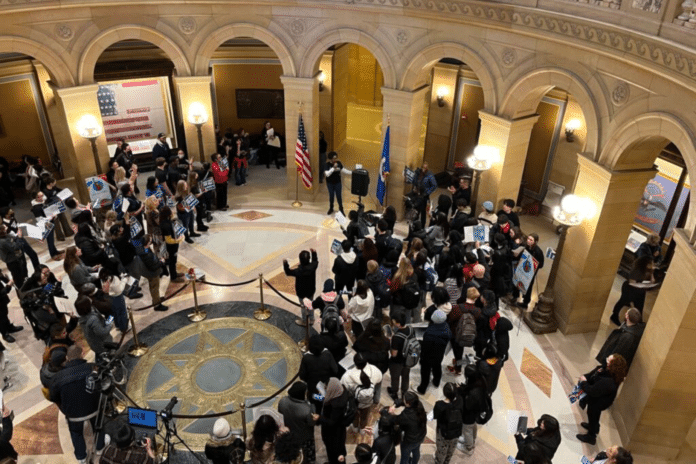
(Center of the American Experiment) — In this edition of Follow the Money™, we begin what ultimately will be a deep dive into the state’s ethnic studies industrial complex.
One of the more controversial bills passed by the Minnesota Legislature in 2023 mandates that ethnic studies be embedded throughout the state’s K-12 academic standards and benchmarks. Passed as part of a 251-page omnibus education budget bill, the changes to K-12 education will have profound impacts.
Given its importance, the bill has received relatively little local media attention. There were a few articles published as the underlying bills were moving through the legislative process. The Minneapolis Star Tribune, among others, did pieces. The reporting uniformly focused on process, with little reporting into the content of the new standards.
It was left to national outlets to report on the actual controversy with the bill.
MPR noted that the bill was slightly watered down as it moved through the legislative process:
“An amendment to the bill removed the word ‘critical’ from that definition and makes ethnic studies a requirement that high schools provide, but does not make the class a graduation requirement.”
But the final product is bad enough. The definition of “ethnic studies” now embedded in state law (120B.25], reads as follows:
“Ethnic studies analyzes the ways in which race and racism have been and continue to be social, cultural, and political forces, and the connection of race to the stratification of other groups.”
Note the appearance of the word “political.”
And ethnic studies won’t be limited to high schools. By the 27-28 school year, it must be incorporated into elementary and middle schools, by law. Going forward, all curricula must be “antiracist.”
Where does this stuff come from? As always, there is a backstory. We begin our take in media res.
In 2019, the St. Paul-based Bush Foundation gave a $10,000 grant to a Detroit-based nonprofit to help fund a conference in Minneapolis. The Bush Foundation was created with a fortune made decades ago through 3M.
The conference in 2019 they helped fund was called the “Free Minds, Free People Conference” and the nonprofit receiving the Bush grant is called the Education for Liberation (EdLIb) Network. The biennial Free Minds conference is a production of EdLib.
The full list of sponsors for the 2019 Minneapolis edition of the Free Minds conference can be found here.
The Bush Foundation is listed, of course. But also among the 2019 sponsors are the taxpayer-supported Minnesota Historical Society and the state Science Museum. Five different departments of the University of Minnesota contributed, along with Normandale Community College. Education Minnesota (teachers union), the Minneapolis Foundation, and other private universities and local nonprofit organizations are listed as sponsors.
According to IRS filings, the Education for Liberation Network was incorporated as a 501(c)(3) nonprofit in 2018. Its tax-exempt status was briefly suspended by the IRS in 2020 for failure to file any income tax returns.
EdLib appears to have filed its first tax return in 2022 for the 2021 tax year. The nonprofit reported a little over $700,000 in revenue for the year, with $578,000 coming from contributions and grants. The bulk of those funds can be traced to a single $500,000 grant from the Nellie Mae Foundation. Nellie Mae had previously given EdLib a total of $8,500.
Nellie Mae was a student loan company, which spun off a nonprofit foundation before being sold to the formerly quasi-governmental Sallie Mae student loan company (now private).
In addition, EdLib received $10,000 from the leftist New Venture Fund in 2019.
The EdLib’s 2019 “Free Minds” conference inspired the creation of a local chapter of Education Liberation, their first (and only) state-level chapter. As EdLib MN tells their origin story:
“The Minnesota Chapter of the Education for Liberation Network began in the summer of 2019 immediately following the Free Minds, Free People Conference in Minneapolis, MN. Ed Lib Minnesota is comprised of the core 2019 FMFP local organizing committees along with a growing network of teachers, youthworkers, teaching aids, educators’ union organizers, academics, policy advocates, parents, and youth-led organizations.”
And what is the local group’s goal?
“The goal of EdLib MN is to be a political force in the state of MN to contend with the status quo of colonial education that prioritizes Eurocentric curricula, predominantly white educators and administrators, and a persistent attack on the power of communities to be self-determined.”
Note the appearance of the word “political.”
In 2020 (stay with me here), the George Soros-funded Open Society Foundation gave a $300,000 grant to a Minnesota-based non-profit.

In 2021, the Headwaters Foundation for Justice gave EdLib MN a $15,000 grant. EdLib MN was one of 20 organizations to receive this specific grant from Headwaters, which consist of “BIPOC-led organizations leading Minnesota to collective liberation.”
EdLib MN was one of four organizations newly funded by Headwaters in 2021. Headwaters reports giving EdLib MN a second grant in 2021, this one for $10,000.
And you knew that more Minnesota taxpayer money had to be directly involved. The state Professional Educator Licensing and Standards Board in 2020 gave a $34,500 grant to EdLib MN:

Speaking of ethnic studies summer camp, the Bush Foundation provided a $25,000 grant for a camp in 2021:

Now we’ve come full circle on follow the money.
For its part, EdLib MN has become a “proud member” of the Minnesota Ethnic Studies Coalition (MESC), formed in the fall of 2019. In EdLib MN’s telling of the story:
“In 2020 the decision was made to pack the MN social studies revision committee, led by the MN Department of Education (MDE), to demand that Ethnic Studies be included in social studies curricula.”
And they succeeded. EdLib MN was indeed appointed to the social studies standards committee, along with future coalition members Education Evolving and Navigate MN (n/k/a Unidos MN). The state Department of Education dutifully incorporated the following language for the revised social studies standards, adopted in 2021:

EdLib MN appears to be the MESC’s lead sponsor. The group’s membership also includes the usual assortment of ethnic-group-focused advocacy groups (Asian, Hispanic), state and local teachers unions, etc. In addition, there is an environmental group and the overtly political nonprofit Isaiah.
Fast forward to 2023, and the newly passed Minnesota law calls for a 25-member “working group” to implement the new ethnic studies education requirements. The group must be appointed by the state Department of Education next year, as follows:
“The commissioner must appoint members of the working group by April 1, 2024, with input from the Minnesota Ethnic Studies Coalition.”
Yes, that Minnesota Ethnic Studies Coalition (MESC). (April Fools Day. Nice touch.) Furthermore, working group members “must have” a “demonstrated commitment to Ethnic Studies.” No neutrals or skeptics are allowed.
My colleague Katherine Kersten has compiled a complete history of EdLib, its Coalition and their role in promoting ethnic studies in Minnesota.
Funded with your tax dollars, EdLib and the Coalition will staff the committee that will design 100 percent of the curricula used to educate your children.
What could go wrong?
EdLib MN and MESC are both members of the national Coalition for Liberated Ethnic Studies. Among this group’s “points of unity” is the following:
“Teachers, schools, and school districts understand the importance of authentic Ethnic Studies, and have sufficient support to withstand attacks from Zionist and other right-wing forces and liberalism, including attacks on Critical Race Theory, which is central to Ethnic Studies as a discipline.”
In addition to its points of unity, the group follows the seven “C’s” of ethnic studies. “C” number 4 reads:
“Critique empire and its relationship to white supremacy, racism, patriarchy, cis heteropatriarchy, capitalism, ableism, anthropocentrism, and other forms of power and oppression at the intersections of our society.”
Whatever that means.














